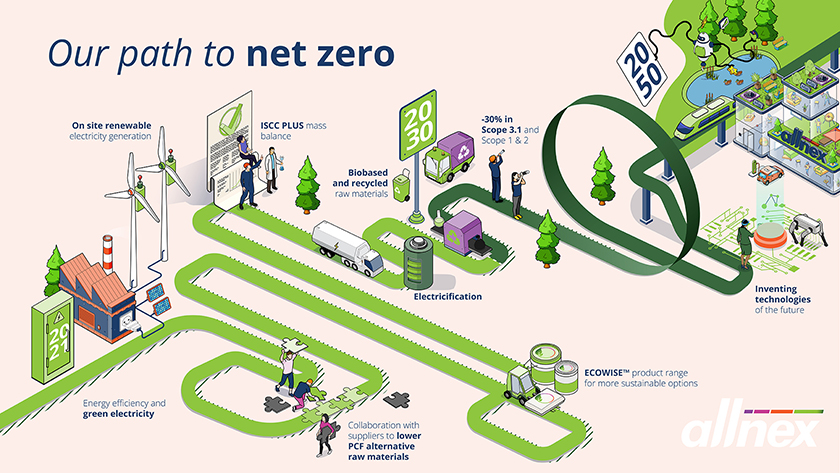More news
- Innovative coatings mitigate effects of deepening climate change
- View from the UK: Navigating chemical policy and sustainability
- Focus on adhesives: Unveiling unbreakable bonds – Testing redefines physical strengt...
- Focus on adhesives: Henkel and Covestro collaborate for sustainability of engineered wood ...
- Advances in construction chemical technology: What’s new in 2024?

allnex, a leading producer of speciality polymers with a clear focus on sustainability, is making a next step on its decarbonisation journey to become a net zero company by 2050. To manifest this commitment, allnex has set a Scope 3.1 emission reduction target of 30% by 2030
Benoit De Becker, Sr. VP Innovation & Sustainability emphasises, “By prioritising Scope 3.1 emission reduction, allnex intensifies its efforts to protect the environment and work with our customers and suppliers to drive positive impact on society. Our commitment ensures that our customers and end-users will benefit from significantly lower carbon footprint, contributing to their own sustainability goals.”
allnex is already making good progress towards its absolute Scope 1 & 2 emissions reduction target (-30% by 2030) and is now increasing its focus and efforts by publicly committing to a Scope 3 reduction target. This is a crucial step in its ongoing mission to create a more sustainable future for all next generations and perfectly aligns with the company’s core values of sustainability and innovation.
While reducing Scope 1 and 2 emissions remains a high priority for allnex, we acknowledge that these emissions only make a limited contribution to our cradle-to-gate product footprint. The majority of our finished product’s footprint is directly tied to the raw materials we utilise. Therefore, it is critical to include a Scope 3.1 reduction target as part of our strategic focus, encompassing indirect emissions associated with the use of purchased products. This comprehensive approach extends beyond our immediate operations, reflecting our commitment to driving meaningful change and exceeding the expectations of our customers and society.
READ MORE:
Reintroducing the wheel: Linseed paint as the natural option
“As we navigate the complex landscape of sustainability, our commitment to emission reduction isn’t just a goal; it’s a strategic imperative. By setting ambitious targets across our value chain, we’re not only shaping a more sustainable allnex, but we’re influencing the very essence of industry standards. In every reduction percentage, we see an opportunity for innovation, collaboration, and a profound impact on the global footprint. We’re not just pledging for a greener tomorrow; we’re strategically designing it, ensuring that every decision propels us toward a net-zero future, setting a standard that goes beyond conventional expectations”, says Miguel Mantas, allnex CEO.
To achieve this goal, allnex will implement a series of strategic measures:
- Value chain collaboration – We are actively engaging with our suppliers and customers, fostering collaboration across the value chain to optimise processes and minimise environmental impact.
- Recycled and bio-based materials: We are increasing our use of recycled and bio-based raw materials in our manufacturing processes. This shift not only reduces our carbon footprint but also supports the circular economy.
- Mass-balanced alternatives: Embracing third party certified mass-balanced alternatives, we will offer sustainable options without compromising product quality. This allows us to provide environmentally conscious solutions to our customers.
- Innovation: allnex, broadly recognised for its innovative culture, will continue to focus on innovation as a main driver for sustainability. Our mission is to design and deliver superior alternative solutions for existing technologies to meet the evolving needs of our customers.







